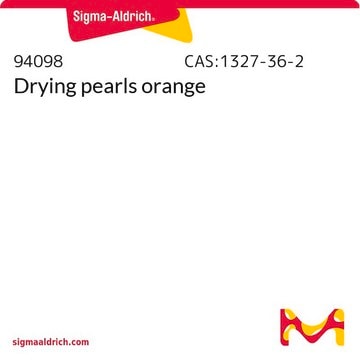10087
Silica gel Inorganic Sorbent
granular, 18-70 mesh, orange
Synonym(s):
Silica gel
Sign Into View Organizational & Contract Pricing
All Photos(1)
About This Item
CAS Number:
EC Number:
MDL number:
UNSPSC Code:
23201100
PubChem Substance ID:
NACRES:
SB.52
Recommended Products
product name
Silica gel orange, granular, 0.2-1 mm
grade
high-purity grade
Quality Level
form
granular
technique(s)
LPLC: suitable
surface area
500 m2/g , approx.
matrix
Silica
matrix active group
silica
particle size
0.2-1 mm
pore size
60 Å mean pore size
bp
2230 °C
mp
>1600 °C
separation technique
hydrophilic interaction (HILIC)
SMILES string
O=[Si]=O
InChI
1S/O2Si/c1-3-2
InChI key
VYPSYNLAJGMNEJ-UHFFFAOYSA-N
Looking for similar products? Visit Product Comparison Guide
General description
Silica gel, highly porous textured matrix are generally used for synthesis of adsorbents. They are corpuscular in structure. Silica surface have a layer of hydroxyl groups and adsorbed water molecules are removed by drying at high temperature or even by treatment with suitable reagents. Silica gel surface plays significant role in catalysis, chemical separation and microelectronic fabrications.
Application
Silica gel was used:
- on glass plates for preparative TLC and on aluminium sheets for analytical TLC
- in vacuum chromatography and TLC
- in column chromatography
Storage Class Code
11 - Combustible Solids
WGK
nwg
Flash Point(F)
Not applicable
Flash Point(C)
Not applicable
Personal Protective Equipment
dust mask type N95 (US), Eyeshields, Gloves
Choose from one of the most recent versions:
Already Own This Product?
Find documentation for the products that you have recently purchased in the Document Library.
Customers Also Viewed
Proton NMR study of dehydration of the silica gel surface
Bronnimann
Journal of the American Chemical Society, 110, 2023-2026 (1988)
Bioactive properties of wild blueberry fruits
Smith, M. A. L., et al
Journal of Food Science, 65, 352-356 (2000)
S Jayaraman et al.
Chemosphere, 44(2), 181-191 (2001-07-11)
In this study, we compared microwave solvent extraction (MSE) to conventional methods for extracting organic contaminants from marine sediments and tissues with high and varying moisture content. The organic contaminants measured were polychlorinated biphenyl (PCB) congeners, chlorinated pesticides, and polycyclic
MODIFIED AND UNMODIFIED SILICA GEL USED FOR HEAVY METAL IONS REMOVAL FROM AQUEOUS SOLUTIONS
Tzvetkova, P., and R. Nickolov.
Journal of the University of Chemical Technology and Metallurgy, 47, 498-504 (2012)
F. Daayf et al.
Plant physiology, 113(3), 719-727 (1997-03-01)
Phenolic compounds extracted from cucumber (Cucumis sativus L.) leaves were separated and analyzed for their differential presence and fungitoxicity in relation to a prophylactic treatment with Milsana (Compo, Munster, Germany) against powdery mildew (Sphaerotheca fuliginea). Based on our extraction and
Our team of scientists has experience in all areas of research including Life Science, Material Science, Chemical Synthesis, Chromatography, Analytical and many others.
Contact Technical Service


